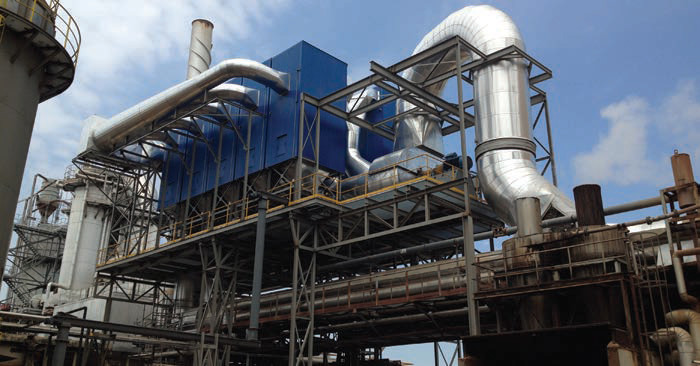Hurricane force
31 January 2020ACS designs customised cyclone systems to serve specific client needs
Cyclones are widely used in wood-based panel board plants, either for fly ash reduction before rotary dryers, reducing fire risks and enhancing product quality, or serving as end particle collectors and dryers in particleboard plants.
Although this technology is loved by the industry, thanks to its simplicity, robustness and cost-effectiveness, newly imposed emission limits demand cyclone efficiency to be dramatically improved.
Portugal-based Advanced Cyclone Systems (ACS) has developed in-house specialised scientific knowledge in particle agglomeration modelling (PACyc) and numerical optimisation. The revolutionary concept of particle agglomeration is essential to explain how cyclones really work and, consequently, to optimise them. The outcome of ACS’s research is not a universal solution, says the company, but is a set of unique cyclone families and systems serving specific client needs and customisable for each application.
One notable application has been at Sonae Indústria’s MDF plant at Mangualde, Portugal, where ACS designed and supplied a turnkey Hurricane cyclone system.
Hurricane cyclones are patented numerically optimised cyclones. Hurricane geometries maximise powder collection for each different application, while minimising re-entrainment and keeping pressure drop at reasonable levels. Hurricane cyclones demonstrate efficiencies in capturing very fine powders with a median volume diameter (MVD) of less than 5μm.
These cyclones are the output of nonconvex, non-linear problems formulated and solved after years of work in partnership with the faculty of engineering of Porto and incorporate the most recent findings of the impact of agglomeration in the cyclone collection efficiency (Chemical Engineering Journal 162 (2010) 861–876). ACS says a single Hurricane is more efficient than any other known cyclone available in the market for the same pressure drop.
For Sonae Indústria, ACS designed and supplied a turnkey Hurricane cyclone system which was installed downstream of an existing multi-cyclone to capture fine fly ash particulate (burnt and unburnt), thereby enabling the use of a wood waste fired thermal oil heater.
The problem and the solution
The company was forced to use a natural gas fired hot gas generator for drying fibre despite having the necessary amount of thermal energy available in the exhaust stream of a wood waste fired thermal oil heater. The problem of using the biomass thermal oil heater was the emission of fine burnt and unburnt particulate, which were carried over with the dried fibre and finally deposited on the final product – wood panel boards. These were systematically rejected by quality inspections. ACS was given the challenge of solving this problem and of enabling the use of the existing biomass fired thermal oil heater. The system to be designed would have to cope with two distinct operating conditions due to the different moisture content of the biomass in summer and winter.
The results proved to be better than expected in terms of separation efficiency, allowing Sonae to use biomass of a lower quality and higher moisture content and still be under the threshold of particulate concentration to have a top quality product. Additionally, the system proved to always work at a pressure drop under 1kPa due to the newly designed outlet gas plenums of the system resulting in increased energy savings and shorter paybacks.
Another company to benefit from ACS’s Hurricane cyclone technology is Britton Timbers, a major international importer and exporter of exotic hardwoods based in Tasmania, which also has interests in timber harvesting and sawmilling.
Britton Timbers had a 2.5MWth Steamline boiler burning woodchips (eucalyptus shavings and green sawdust) and was equipped with a multi-cyclone, but couldn’t achieve the needed PM emissions limit to meet the new Australian regulation, which is currently 100mg/Nm3 for this kind of process.
The company asked ACS to guarantee emissions below 80mg/Nm3 allowing a good safety margin and compliance in terms of PM emissions with a future stricter legislation. Considering the usual silice content on the fly ashes from wood chips combustion, ACS kept the existing multi-cyclone as a first stage separation to remove the coarser and more abrasive particles and installed the final separator (Hurricane MK) downstream with an additional fan dimensioned to overcome its own pressure drop.
For this project at Britton Timbers, after confirming what particle size distribution (PSD) to consider for the case, ACS designed a Hurricane MK system comprising eight Hurricane MK numerically optimised cyclones, with ø800mm, disposed in two batteries of four units. The system is capable of reducing emissions to under 50mg/Nm3 at a pressure drop of 0.9kPa, maintaining that the emissions after the existing multicyclone are under 250mg/Nm3. Results have confirmed that the Hurricane MK safely achieves PM emissions under the guaranteed 80mg/Nm3.
